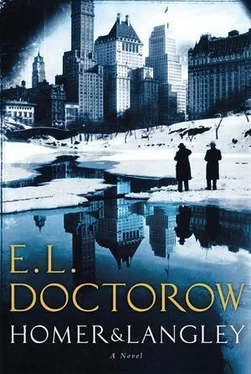E. Doctorow - Homer & Langley
Здесь есть возможность читать онлайн «E. Doctorow - Homer & Langley» весь текст электронной книги совершенно бесплатно (целиком полную версию без сокращений). В некоторых случаях можно слушать аудио, скачать через торрент в формате fb2 и присутствует краткое содержание. Год выпуска: 2009, Издательство: Random House, Жанр: Современная проза, на английском языке. Описание произведения, (предисловие) а так же отзывы посетителей доступны на портале библиотеки ЛибКат.
- Название:Homer & Langley
- Автор:
- Издательство:Random House
- Жанр:
- Год:2009
- ISBN:нет данных
- Рейтинг книги:5 / 5. Голосов: 1
-
Избранное:Добавить в избранное
- Отзывы:
-
Ваша оценка:
- 100
- 1
- 2
- 3
- 4
- 5
Homer & Langley: краткое содержание, описание и аннотация
Предлагаем к чтению аннотацию, описание, краткое содержание или предисловие (зависит от того, что написал сам автор книги «Homer & Langley»). Если вы не нашли необходимую информацию о книге — напишите в комментариях, мы постараемся отыскать её.
Brilliantly conceived, gorgeously written, this mesmerizing narrative, a free imaginative rendering of the lives of New York’s fabled Collyer brothers, is a family story with the resonance of myth, an astonishing masterwork unlike any that have come before from this great writer.
Homer & Langley — читать онлайн бесплатно полную книгу (весь текст) целиком
Ниже представлен текст книги, разбитый по страницам. Система сохранения места последней прочитанной страницы, позволяет с удобством читать онлайн бесплатно книгу «Homer & Langley», без необходимости каждый раз заново искать на чём Вы остановились. Поставьте закладку, и сможете в любой момент перейти на страницу, на которой закончили чтение.
Интервал:
Закладка:
DESPITE THE ASSURANCES of his letter, my brother returned was a different man. His voice was a kind of gargle and he kept coughing and clearing his throat. He had been a clear tenor when he left, and would sing the old arias as I played them. Not now. I felt his face and the hollowness of his cheeks and the sharpness of his cheekbones. And he had scars. When he removed his uniform I felt more scars on his bare back, and also small craters where blisters had been raised by the mustard gas.He said: We are supposed to go on parade, marching in lock-step, one battalion after another, as if war is an orderly thing, as if there has been a victory. I will not parade. It is for idiots.But we won, I said. It’s Armistice.You want my rifle? Here. And he thrust it into my hands. This heavy rifle actually fired in the Great War. He was supposed to have stowed it at the armory on Sixty-seventh Street. Then I felt his overseas cap fitted on my head. Then suddenly his tunic was hanging off my shoulder. I felt ashamed that for all the accounts of the newspapers’ war that Julia read to me in her Hungarian accent at the breakfast table each morning, I had still not understood what it was like over there. Langley would tell me through the following weeks, interrupted occasionally by poundings on the door by the army constabulary for he had left his unit before being legally mustered out and given his discharge papers, and of all the difficulties with the law we were to endure in the years to come, this one, the matter of his technical desertion, was like the preview.Each time I answered and swore that I hadn’t seen my brother, and that was no lie. And they would notice me looking at the sky as I spoke and would beat a retreat.And when the Armistice Day parade was held, and I could hear the excitement in the city, people hurrying past our house, the cars crawling, their horns blowing, and through all of that the distant strains of military march music, I heard from Langley, as if antiphonically, of his experiences. I would not have asked him about it, I wanted him to be his old self, I recognized that he needed to recover. He had not known till he came back that our parents had succumbed to the flu. So that was another something he had to deal with. He slept a lot and didn’t take any notice of Julia, at least at first, although he might have found it odd to see her serving dinner and then sitting down to join us. So with all of that, without any prompting, while the city turned out for the victory parade, he told me about the war in his hoarse voice, which would at times drift into a whisper or a wheeze before recovering its gravelly tone. At moments it was more as if he was talking to himself.He said they couldn’t keep their feet dry. It was too cold to take off your shoes, there was ice in the trench, ice water and ice. You got trench foot. Your feet swelled and turned blue.There were rats. Big brown ones. They ate the dead, they were fearless. Bite through the canvas sacks to get at the human meat. Once, with an officer in his wood coffin and the lid not fast, they nosed it back and in a minute the coffin was filled with a hump of squealing rats squirming and wiggling and fighting, a wormy mass of brown and black rat slime turning red with blood. The officers shot into the mass with their pistols with the rats pouring over the sides and then someone leapt forward and slammed the coffin lid back down and they nailed it shut with the officer and the dead and dying rats together.Attacks always came before dawn. First there would be heavy bombardment, field guns, mortars, and then the lines advancing out of the smoke and mist to go down under the machine-gun fire. Langley learning to lean back against the front wall of the trench so as to catch the Kraut with his bayonet as the man leapt over him, like the bull goring the bullfighter in the buttocks or in the thigh, or worse, and even losing hold of the rifle when the poor fool took the bayonet with him as he fell.Langley was almost court-martialed for seeming to threaten an officer. He had said, Why am I killing men I don’t know? You have to know someone to want to kill him. For this aperçu he was sent out on patrol night after night, crawling over a furrowed blasted plain of mud and barbed wire, pressing himself to the ground when the Very flares lit up the sky.And then that one morning of the yellow fog that didn’t seem to be much of anything. It hardly smelled at all. It dissipated soon enough and then your skin began to burn.And to what purpose, Langley said to himself. You watch, you’ll see.As I have, simply by living on.On the day Langley went by himself up to the Woodlawn Cemetery to visit our parents’ graves, I placed his Springfield rifle on the fireplace mantel in the drawing room and there it has stayed, almost the first piece in the collection of artifacts from our American life.
THE FACT THAT I had taken up with Julia had not sat well with the senior maid, Siobhan, who was used to giving the orders in their household world of designated responsibilities. Julia, risen from my bed, had assumed an elevated status for herself and was disinclined to be ordered about. Her attitude amounted to insurgency. Siobhan had been in our employ far longer and as she told me tearfully one day, my mother had not only found her work exceptional but had come to feel about her that she was like a member of the family. I had known nothing of this. I knew Siobhan only by her voice, which, without thinking much about it, I had found unattractive, a thin high whiny voice, and I knew she was a stout woman by the way she breathed from the slightest exertion. Also there was a smell about her, not that she was unclean but that her pores produced a kind of steambath redolence that remained in a room after she had left it. However, with Langley’s return I was intent on keeping peace in our house, for his gloomy presence and irritability with every little thing had unbalanced us all, including, I might say, the Negro cook, Mrs. Robileaux, who prepared what she wanted to prepare and served what she wanted to serve without advice from anyone, including Langley, who kept pushing his plate aside and leaving the table. So there were undercurrents of dissatisfaction coming from all directions — we were a household already far removed from that of my parents, of whose orderly administration and regally stolid ways I found myself newly appreciative. But not having the faintest idea of how to deal with any of this emotional disorder, I made a mental distinction between anarchy and evolutionary change. The one was the world falling to pieces, the other was only the inevitable creep of time, which was what we had now in this house, I decided, the turning over of the seconds and minutes of life to show its ever new guise. This was my rationalization for doing nothing. Langley was privileged by his veterancy and Mrs. Robileaux by her cooking skills. I should have done something to support Siobhan but instead found my own guilty solace in looking away and accepting Julia on her own terms.The girl was amatory in a matter-of-fact way. I had heard about Europeans that they didn’t make as much of a fuss about lovemaking as our women did, they just went ahead and accepted it as another appetite, as natural as hunger or thirst. So call Julia naughty by nature, but more than that, ambitious, which is why, having achieved my bed, she began to lord it over Siobhan as if in practice for the position of lady of the house. I knew that of course, I am only blind of eye. But I admired the immigrant verve of her. She had come to America under the auspices of a servant supply agency and had made a life for herself working first for a family my family knew, and then after they had moved themselves to Paris, arriving at our door with excellent references. I am sure Julia was older than I by some five or six years. However languorously attentive she was at night, she was up promptly at dawn and returned to her household responsibilities. I would lie there in the still warm sheets where she had lain and compose her image from the lingering tangy smell of her and from what my hands had learned of her person. She had tiny ears and a plump mouth. When we lay head to head, her toes barely reached my ankle bones. But she was generously proportioned, the flesh of her shoulders and arms giving under the lightest pressure of my thumbs. She was short-waisted, high-breasted, and with a firm backside and sturdy thighs and calves. She did not have an elegant foot, it was rather wide and, unlike the smooth soft rest of her, somewhat rough to the touch. Her straight hair when unbound fell below her shoulders — she would arrange herself on all fours above my recumbent form and flip her hair over her face so as to brush my chest and belly, sweeping her hair one way and then the other with a shake of her head. At such times she would murmur sentences which began in English and drifted into Hungarian. Like you this, sir, does the sir like his Julia? And somewhere along the line without my realizing it she would have reverted to her Hungarian, whispering her quizzical endearments as to whether I liked what she was doing so that I imagined I was literate in the Hungarian language. I would pull her down so as to get the same brushing effect from her nipples while her hair lay about my face and in my mouth. We did lots of creative things and kept each other amused well enough. The inside of her fit me rather well. She told me her hair was very light, the color of wheat — she said veet —and that her eyes were gray like a cat.It was Julia’s warm and compliant body and immigrant murmurings that persuaded me to put out of mind the slow grinding away of Siobhan’s honor as her and Julia’s places in the household scheme of things were reversed and Siobhan was the one who found herself taking orders. This good woman had only two recourses, to quit our employ or to pray. But she was a single Irishwoman of middle or even late middle age, with no family as far as I knew. The years of employment in this house had been her life. In such circumstances people cling however unhappily to their jobs and save their money, coin by coin, against the time when they hope to have a decent burial. I did remember that when my mother died, it was Siobhan who wept piteously at the grave, she, Siobhan, as sentimental about death as only the deeply religious can be. And so, finally, prayer would be the means by which she would endure the profound offense to her pride of place and sense of possession of the house that a good servant has who is responsible for its upkeep. And if her prayers looked toward her restoration or, at moments of bitterness that would later have to be confessed to the Father, to vengeance, whatever the Lord might saith, I would have to say that they were answered in the Protestant form of Perdita Spence, a friend of Langley’s from childhood whom he had escorted at her coming out, and who now appeared for dinner one night at his invitation.For as the weeks had passed Langley had begun to emerge from his doldrums. Not that you would hear him whistling or finding a reason to be excited about something, but his acerb intelligence was honing up as in the old days. Perdita Spence had stood in his consideration ever since their teens and that I suppose was the closest he could come to an outright feeling for her. I had seen her in our home once or twice before my eyes darkened and I projected that memory now, adding mentally to her age by listening to her conversation. I remembered her main features, which were a long nose and eyes set too close together and shoulders that looked as if she wore epaulets under her shirtwaist. I seem also to have an image in my mind of Miss Spence marching arm in arm with the suffragettes down Fifth Avenue, but that may be an embellishment of my own making. I do know that she was a comfortable height for Langley, who was a six-footer. So she was tall for a woman and, as I listened to her remarks before dinner about the society of which our two families had been a part, I thought that she was the perfect social match as well — someone who in her person invoked the life Langley had lived before he went to war, and so just what he needed to palliate the dark instincts of his own mind.Langley and I had both dressed for dinner and I had somehow imposed upon Julia and Siobhan an armistice of their own so that they could together spruce up the place, which they did apparently, for I smelled the furniture polish on my Aeolian, and the hearth fires in the study and living room were without the choking fumes I had come to expect. Langley had said enough to Mrs. Robileaux to have her fulfill his menu, which consisted of oysters on the half shell, a sorrel soup, and a roast with potato soufflé and peas in the pod. And he had gone to the cellar for a white and a red. But all of Perdita Spence’s chatter ceased abruptly when Julia, after serving the first two courses, brought out the roast and joined us at the table. I heard the scraping of Julia’s chair, a delicate cough, and even, perhaps, her deferential smile.After a long silence Perdita Spence said: How novel, Langley, to put your guests to work. But where is my apron?Langley: Julia is not a guest.Miss Perdita Spence: Oh?Langley: When serving she is one of the staff. When seated she is Homer’s inamorata.It’s a kind of hybrid situation, I said by way of clarifying things.There was silence. I heard not even a wine sip.And after all, said Langley, human identity is a mysterious thing. Can we even be sure there is something called the Self?Miss Perdita Spence’s peroration, addressed only to Langley, the one person in the room high enough in her estimation to have her opinion, was actually quite interesting. There was not the umbrage you would expect from someone of her class finding herself at table with a servant. She said — and I can only paraphrase after these many years — that given brother Homer’s deficient state she could understand his availing himself of whatever poor creature came to hand. But to sit this same creature at the dinner table was the boorish act of a pasha for whom it was not enough to exercise his power, he must also put it on display. Here was this immigrant woman, who had to bend to his will lest she lose her job, sat down to her obvious discomfort in order to advertise her total servitude. A woman is not a pet monkey, said Miss Spence, and if she is to be used to her shame at least let it be in the dark, where no one can hear her weeping but her abuser.I’ll take you home, said Langley.And so the dinner was left to my inamorata and me. Julia filled my plate and sat herself beside me. Not a word was spoken, we knew what we had to do. With Mrs. Robileaux coming out of the kitchen periodically to stand at the doorway and glare at us, we proceeded to eat for four.I had no idea what Julia was thinking. Surely she had gotten the gist of Miss Spence’s critique, but I sensed her indifference as if she, Julia, couldn’t have cared less what this stranger had to say. She went about dinner with the same gusto with which she cleaned house or made love, refilling my wine glass, and then her own, serving me another cut of the roast before replenishing her own plate.And now here is the sequence of thoughts I had, for I remember them quite clearly. I recalled that Julia had appeared unsummoned in my bedroom the evening of the day I had asked to touch her face. I had not meant anything by that, I merely wanted information, I like to know what the people around me look like. I had felt her jaw, which was large, and her wide full mouth and her small ears and slightly splayed nose and her forehead which was broad, with a high hairline. And that same night she had slipped into my bed and waited.Was Perdita Spence right — that this immigrant girl in order to keep her job was merely responding to what she thought was a summons? Langley hadn’t believed that — he had seen the assertiveness of the maid, who in a relatively short time had taken charge of the household and bedded his brother.But now here is what happened: In the process of leaving a clean plate, I was working on the last of the pea pods, crunching them in my teeth and savoring their sweet green bitter-edged juices, and all at once I found myself thinking of the truck farm at the corner of Madison Avenue and Ninety-fourth Street, where as a sighted child I would go along the rows with my mother in the early autumn to pick the vegetables for our table. I’d pull the carrot bunches out of the soft ground, pluck the tomatoes from their vines, uncover the yellow summer squash hiding beneath their leaves, scoop up the heads of lettuce with both hands. And we so enjoyed ourselves at these times, my mother and I, as she held her basket out for me to deposit what I had chosen. Some of the plants rose above my head and the sun-warmed leaves would brush my cheeks. I chewed the tiny leaves of herbs, I was made giddy by the profusion of vivid colors and the humid smell of leaf and root and moist soil on a sunny day. Of course, along with my sight, that farm had long since gone, an armory in its place, and I suppose it was the wine that was allowing me to dredge from the depths of my unforgiving mind the image of my gracious mother when she was in such uncharacteristically loving companionship with her small son.Taking hold of Julia’s capable hand in this emotional moment of recall, I found my palm resting not on flesh but on stone. It was a ring the maid wore and, as I circled it with three fingers the better to understand its size and shape, I realized it was the heavy diamond ring of my mother’s that had shot shards of sunlight into my eyes as she held the handle of our garden basket.Julia murmured, Ah dear surr or something of the sort and I felt her other hand on my cheek as she gently tried to disengage and I just as gently wouldn’t let her.And so this was the extraordinary sequence of events for which I suppose I have Miss Perdita Spence to thank, although she is at this date no longer among the living. Or perhaps it was my brother’s decision to invite her for dinner, or perhaps I should go further back to the war that had so changed him so that in his gruff uncompromising way he would only half admit to himself that he might mend, if mend he would, by marrying, and so begin his grudging quest by renewing his acquaintance with that tall sharp-shouldered schoolmate of his who did not condone the depraved doings in our household.We had a trial, naturally, Langley and I the sitting judges, Siobhan the prosecuting attorney. This was in the library, where the shelved books, the globe, the portraits served for a juridical setting. Julia, my Hungarian darling, wept as she claimed it was Siobhan’s idea to lend her the ring from my mother’s jewelry case so she, Julia, could be more the table guest than the serving maid. It would be a kind of credential, she insisted, although that word was not in her vocabulary. To look so Mr. Homer surr and I was to be marry, is what she actually said. I might have decided to take her side, but my own credibility as a responsible member of this household had been seriously damaged when I’d had to admit to Langley that I had forgotten about my mother’s jewelry when I’d settled her estate, and so it had remained, subject to theft, in the small unlocked wall safe in her bedroom behind a portrait of a great-aunt of hers who had achieved some notoriety by riding camelback across the Sudan for what reason nobody quite knew.Siobhan denied having bestowed the ring on the girl, who, she said, had access to the entire house as the self-appointed maid in authority and could have noseyed about my mother’s bedroom without anyone being any the wiser. Siobhan reminded everyone how long she had been in service to this family as opposed to this thief who was trying to make her out as some devilish conspirator. And why would I myself help this slattern, she being the thief she is, said Siobhan.Langley, he of the judicious temperament, said to Siobhan, Petitio principii — you assume in your premise what you have to establish in your conclusion.That may be, Mr. Collyer, said she, but I know what I know.And so the case was made.Langley afterward took the jewel case, which contained not just that ring, but brooches, bracelets, pairs of earrings, and a diamond tiara, and put it in a safe deposit box at the Corn Exchange against the time when we might need to sell these things — a time I couldn’t imagine ever coming, and which of course did come and fairly promptly at that.And now my sweet weeping hard-nippled and felonious bed mate was gone from the premises as unceremoniously as Miss Perdita Spence, as if they were prototypes of the gender with which, through the years, Langley and I would, on one basis or another, find ourselves incompatible.
Читать дальшеИнтервал:
Закладка:
Похожие книги на «Homer & Langley»
Представляем Вашему вниманию похожие книги на «Homer & Langley» списком для выбора. Мы отобрали схожую по названию и смыслу литературу в надежде предоставить читателям больше вариантов отыскать новые, интересные, ещё непрочитанные произведения.
Обсуждение, отзывы о книге «Homer & Langley» и просто собственные мнения читателей. Оставьте ваши комментарии, напишите, что Вы думаете о произведении, его смысле или главных героях. Укажите что конкретно понравилось, а что нет, и почему Вы так считаете.












